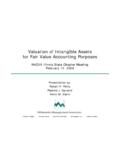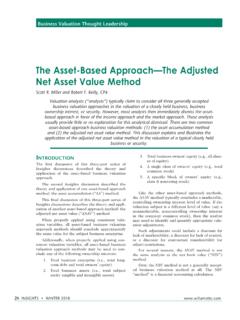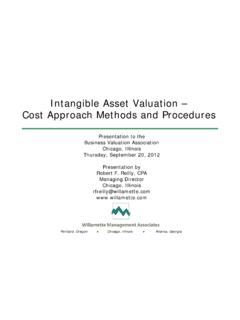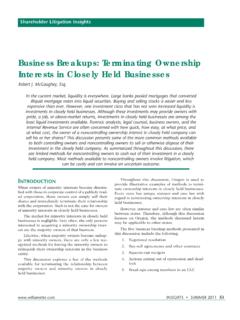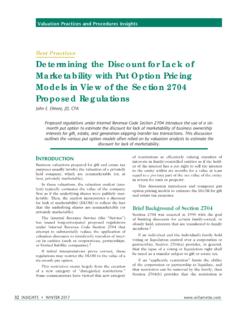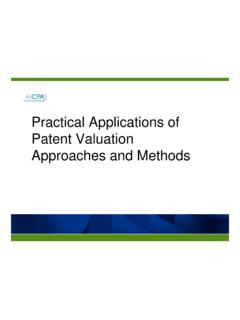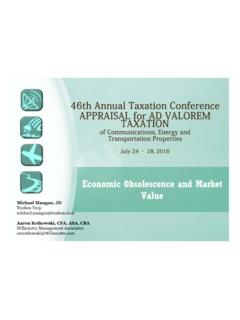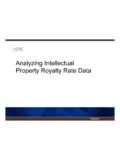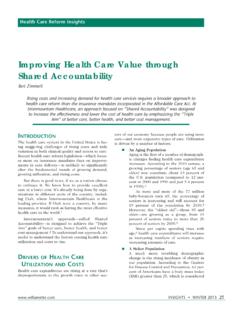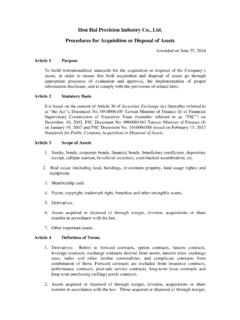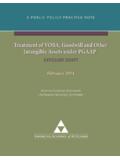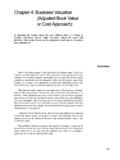Transcription of Sale of the Closely Held Business—Personal …
1 INSIGHTS SPRING 2012 27 Sale of the Closely Held Business Personal Intangible Assets versus company Intangible AssetsChip Brown, CPAI ncome Tax Valuation InsightsPrior to the sale of a Closely held C corporation, the seller corporation s financial advisers should consider any personal intangible assets that may be operated by the corporation. A personal intangible asset is an intangible asset that is created and owned by the corporation owner but is used by the subject corporation. Personal intangible assets may exist when a shareholder s personal reputation, industry expertise, and/or business relationships contribute significantly to the company business value and expected future cash flow.
2 This discussion summarizes what the Closely held corporation owner should consider regarding the identification and documentation of personal intangible assets, particularly with respect to structuring the sale of the Closely held C onThe sale of a Closely held corporation may include the following considerations:1. Complex income tax planning and compli-ance considerations2. Complex business valuation considerations This discussion summarizes the benefits asso-ciated with allocating a portion of the total sale proceeds to personal intangible assets in a sale of a Closely held C may be significant federal income tax benefits to both the buyer and the seller in the transaction if personal intangible assets are treated as property that is sold separately from, but in con-junction with.
3 The sale of the Closely held corpora-tion assets or valuation analyst can serve an important role in both the identification and the valuation of personal intangible assets prior to the sale of a close-ly held C corporation. These valuation analyses can lead to a transaction structure that is tax efficient for both the close corporation buyer and the close corporation on In The sale oF a c corPoraTI onWhen the corporation owner/operator sells the assets of a Closely held C corporation, any gain on the sale of the corporation assets (both tangible assets and intangible assets) is typically taxed twice.
4 First, the gain is taxed when the corporation sells the assets to the corporation buyer such as a corporate , the remaining gain is taxed again when the asset sale proceeds are distributed from the sell-er corporation to the individual owner/operator(s).The Closely held business may be organized as an S corporation, a limited liability company (LLC), a limited partnership (LP), or some other type of pass-through entity for federal income tax purposes. The pass-through type of business tax structure is favorable to the business entity owners from an income tax perspective. That is, the business income 28 INSIGHTS SPRING 2012 generally not subject to federal income tax at the entity level.
5 Rather, the business income is:1. passed through from the company to the business owners and2. taxed at the indi-vidual shareholder/ member/partner , the Closely held business (and most larger business enti-ties) may be organized as a C corporation for fed-eral income tax purposes. With this type of company tax structure, the business income earned by the C corporation is first taxed at the entity level, at the corporation s federal income tax double TaxaTI on IssueTo the extent that the corporation s after-tax profits are then distributed to the individual shareholders (typically as dividends), the profit distributions are taxed again to the individual business owners.
6 These business profit distribu-tions are taxed at the individual shareholder s federal income tax this reason, C corporation business profits are sometimes said to be subject to double taxa-tion that is, once at the corporation level and again at the individual shareholder of a tax pass-through entity are also advantaged (compared to C corporation sharehold-ers) when the Closely held business is sold. This statement is particularly true in the case of a busi-ness sale that is structured as a sale of the company s assume that the Closely held business owner (who may be planning to retire) sells all of the company assets (tangible and intangible) to a competitor.
7 If the seller company is a tax pass-through entity, then the gain on the sale of the com-pany assets is typically taxed once at the business owner the Closely held company sells its assets at a gain, then that gain is typically not taxed at the entity level. Rather, the amount of the gain on the company asset sale (including the sale of the busi-ness goodwill) is taxed once at the individual busi-ness owner contrast, let s assume that the selling com-pany is a C corporation. Again, let s assume that the Closely held corporation owner decides to sell all of the company assets (both tangible and intangible) to a current business the extent that there is a gain on the sale of the company assets (including the sale of the busi-ness goodwill), that gain will first be taxed at the corporation level.
8 When these after-tax gains are then distributed to the company shareholder, these distributions are then taxed again, at the individual shareholder so-called double taxation occurs because a C corporation is a separate taxable entity from its individual shareholders. So, if the C corporation company sells business assets (tangible or intan-gible) that are owned by the corporation, then the corporation has to pay income tax on any gain asso-ciated with that asset For The double TaxaTI on IssueIn structuring the sale of the assets of a Closely held C corporation, it is important for the business owner/operator sellers to distinguish between:1.
9 The sale of any commercial intangible assets that are owned by the company itself and\2. the sale of any commercial intangible assets (including personal goodwill) that are owned by and may be sold by the individual shareholders. In the federal income tax jargon, such business owner/ operator owned intangible assets are called personal intangible assets. Personal InTangIble asseTsPersonal intangible assets are more likely to exist when the individual shareholder is actively involved in the Closely held business operations and business , these individual intangible assets are created or developed by the individual business owner/operator.
10 The business owner/operator then allows his or her company to use the personal intan-gible assets in its regular business personal intangible assets may include the company owner s customer relationships, supplier .. if the C cor-poration company sells business assets .. that are owned by the corporation, then the corporation has to pay income tax on any gain associated with that asset sale. INSIGHTS SPRING 2012 29relationships, created business methods and proce-dures, designs and drawings (related to products or processes), and personal goodwill and intangible assets consist of intangible assets that are:1. developed and owned by an individual com-pany owner and2.
